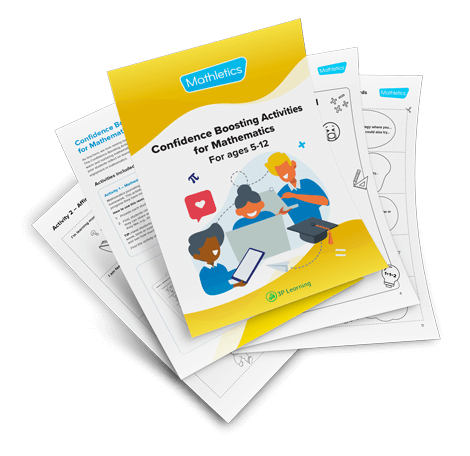
For many students, mathematics is more than just a chore. It’s a source of gut-wrenching stress and constant dread that’s to be avoided at all costs.
That’s because mathematics anxiety is a legitimate condition. It has long-term consequences for learning, and it doesn’t disappear with age.
Here’s what you need to know about mathematics anxiety, plus 18 tips for teachers and parents looking to rebuild the mathematical confidence in young learners.
What is mathematics anxiety?
According to the Australian Mathematical Sciences Institute (AMSI), mathematics anxiety can be defined as:
A phenomenon where individuals suffer from the irrational fear of mathematics to the extent that they become paralysed in their thinking and are unable to learn or be comfortable with mathematics.
This anxiety can occur during a mathematics class or in anticipation of it, and it impedes the working memory that’s so vital for mathematical thinking. Under stress, students have difficulty ‘thinking straight’ and solving even basic problems.
How to spot students with mathematics anxiety
Mathematics anxiety presents in different ways, but most teachers and parents will recognise outward symptoms in students who:
- become tearful or emotional while doing mathematics
- panic in timed mathematics tests or exams
- get confused and flustered by simple mathematics questions, despite their ability level
- skip mathematics lessons or become resistant to homework.
Ultimately this shows in a student’s results too. Without intervention, mathematics anxiety almost always negatively impacts achievement in mathematics.

Build mathematics confidence with FREE printable activities
How common is mathematics anxiety?
Mathematics anxiety is alarmingly common. A 2014 report from AMSI estimated that up to 80% of US college students had experienced mathematics anxiety at some point during their education and that this number is on the rise.
What are the effects of mathematics anxiety on students?
For students, mathematics anxiety becomes a toxic cycle of underachievement. Students who feel anxious about mathematics are more likely to avoid it, thereby missing important learning milestones and falling behind their peers. This in turn increases the initial anxiety, and the cycle continues.
The consequences aren’t just limited to the mathematics classroom either. A 2018 study found that mathematics-anxious students had difficulty concentrating and committing effort across their other subjects too, with procrastination and avoidance becoming a habit. There’s reason to believe these behaviors persist beyond school too.
The biggest impact, however, is felt by society at large. While governments identify STEM (Science, Technology, Engineering, and Mathematics) as a vital area of economic growth and innovation, mathematics anxiety has led an increasing number of students to opt-out of this career pathway. In Australia, this has already led to a shortage of skilled workers for STEM industries.
Where does mathematics anxiety come from?
Contrary to popular belief, mathematics anxiety isn’t a symptom of incompetence. Nor is it the result of being born without a ‘mathematics brain’, as some suggest.
Instead, mathematics anxiety generally stems from how a student perceives their own ability in the subject — regardless of their actual ability level. Even the most gifted student can become terrified of mathematics if they believe:
- “This is too hard for me.”
- “I’ll never be good enough.”
- “Everyone else ‘gets it’ and I don’t.”
- “There’s no way my teacher can help me.”
But what leads a student to think these things?
Parental attitudes toward mathematics
Mathematics anxiety is often unknowingly instilled by parents who have their own negative attitudes toward the subject. This is reflected in such messages as:
- “It’s OK, you’re just not a mathematics person.”
- “You’re just like me — I’ve always been bad at mathematics.”
- “I’ve never used any of that stuff anyway.”
These comments are generally made in an attempt to ease a child’s anxiety — but they do the opposite. Students begin to internalize the idea that they will never succeed at mathematics and receive the implicit message that it’s easier to give up.
Mathematics anxious parents also tend to emulate the teachers that deterred them from mathematics in their own school days. As a result, the punitive and unengaging practices of mathematics teachers decades ago are staying alive through the parents who are now passing them on.
Teachers’ attitudes towards mathematics
Teachers themselves can also pass on mathematics anxiety, particularly in elementary schools. Surveys from CHOOSEMATHS actually found 40% of primary (elementary) teachers felt inadequately trained to teach the subject.
This is particularly problematic as teachers with less mathematics confidence are more likely to
exacerbate student anxiety by:
- relying heavily on textbooks, with minimal face-to -ace teaching
- overusing rote learning and memorization
- depending on timed tests for assessment
- forcing students to engage, instead of presenting mathematics in relevant and interesting ways
- overemphasizing ‘right answers’, instead of student learning and understanding
- failing to differentiate for individual levels of ability.
Schools and the curriculum
Beyond parents and teachers, the structure of mathematics curricula can also contribute significantly to mathematics anxiety. Specifically, this is due to:
- over-reliance on timed, high-stakes testing
- standardized testing with publicly released results
- market-based school models, where student results are publicized to encourage funding and enrollments
- crowded curricula that force teachers to rush through each concept
- reports that quantify ‘correctness’ rather than progress.
All of these are endemic in western mathematics education despite the harm being frequently acknowledged.

Make mathematics fun with Mathletics, an online program trusted by 200,000 educators around the globe!
Reducing mathematics anxiety: Tips for teachers and parents
Educational research suggests that students do not ‘grow out of’ mathematics anxiety. This explains why so many parents and teachers hold onto the negative attitudes they themselves developed at school.
Instead, direct intervention is needed to reduce mathematics anxiety. Schools and policymakers have an important role to play by restructuring mathematics curricula and ensuring teachers have adequate training, but there are other things that can be done in homes and classrooms to make a difference.
How parents can reduce mathematics anxiety
Think critically about your own relationship with mathematics. The more aware you are of your own anxieties or misgivings, the less likely you’ll pass these onto your child.
6 ways parents can reduce mathematics anxiety
- Involve your child in mathematics-related tasks around the house (e.g., cooking, shopping, timetabling). Make it as fun and relevant as possible.
- Improve your own mathematical ability. Jump online and have a look at the fun ways students are learning about mathematics. You might be surprised by how well you ‘get’ it, or the opportunities for your own learning!
- Use an online mathematics program that engages your child with interactive activities, while allowing you to monitor their progress
- Speak to your child’s teachers about how you can reduce mathematics anxiety.
- Change the language used around mathematics at home. Avoid making self-defeating comments about the subject.
- Engage with your child’s mathematics learning. Have regular conversations with their teacher and discuss their challenges and achievements at home.
10 ways teachers can reduce mathematics anxiety
- Build your own mathematical confidence and knowledge base by joining mathematics teaching associations, comparing strategies with colleagues, or reading online sources.
- Equip your students to talk out loud about mathematics. Start by presenting concepts in familiar language before introducing mathematical terminology.
- Use formative assessment regularly to get a sense of student progress before they sit a summative assessment
- Equip your students to talk out loud about mathematics. Start by presenting concepts in familiar language before introducing mathematical terminology.
- Take the focus off right and wrong answers. Instead value risk-taking, effort, and progress.
- Identify knowledge gaps that have arisen in previous years and work to fill them, so sequential learning isn’t impacted.
- Find ways to make mathematics enjoyable and real. Project-based learning and RICH tasks are a good start.
- Give parents quick and simple mathematics activities that they can engage their children with at home.
- Present different perspectives of a concept. Highlight that mathematics isn’t as rule-bound and inflexible as it might seem.
- Celebrate mistakes as learning opportunities. Adopt a ‘failure-as-enhancing’ mindset rather than a ‘failure-as-debilitating’ mindset.
- Differentiate student learning for individual levels of ability. Create differentiated resources or use an online mathematics program that lets students learn at their own pace.

How Mathletics reduces mathematics anxiety in students



